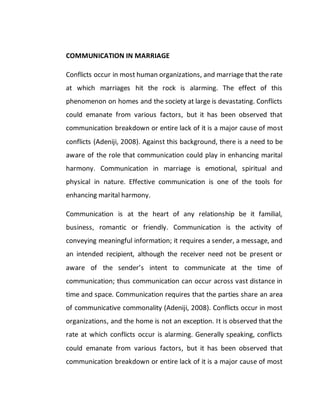This document discusses the importance of communication in marriage. It states that lack of communication or poor communication is a major cause of conflicts in marriages. Effective communication is one of the most important tools for enhancing marital harmony. The document then provides details on different types of communication, both verbal and non-verbal. It also discusses principles and techniques for effective communication such as listening, understanding your audience, expressing yourself clearly, providing feedback, and asking questions. Overall, the key point is that communication is vital for a healthy marriage and effective communication techniques can help improve marital stability and harmony.



























































